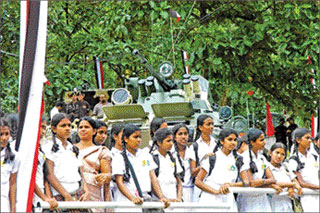|
-new-n.jpg)
Deyata Kirula in Anuradhapura
The mega exhibition Deyata Kirula which is scheduled to be held in
Oyamaduwa next year to coincide with Independence Day will give a
facelift to many remote areas in the ancient city of Anuradhaphura. A
number of programmes will be implemented in the Anuradhapura District to
develop infrastructure and human resources prior to the exhibition.One
of the key areas that would come into focus is the provision of
facilities to school libraries in every Divisional Secretariat in the
Anuradhapura District .
 According
to the Secretary to the President, Lalith Weeratunga schools where
libraries need to be developed will be selected by the organising
committee in due course. According
to the Secretary to the President, Lalith Weeratunga schools where
libraries need to be developed will be selected by the organising
committee in due course.
The decision to hold the Deyata Kirula exhibition in Oyamaduwa, in
the Anuradhapura District has been taken with the objective of bringing
dividends of development to the remote areas of the country which have
seen no such development for decades. This was disclosed by President
Mahinda Rajapaksa at a special meeting held at the Temple Trees recently
with political leaders of the North Central Province and Secretaries of
Ministries. While discussing the numerous programmes that need to be
implemented parallel to the mega exhibition, the President instructed
those present to ensure that they be carried out in a manner that would
benifit all Divisional Secretariats in the area.
The Deyata Kirula exhibition which showcases the produce and services
from over 1,200 government, private and international organisations, and
also displays past, ongoing and proposed development activities in the
country, is very popular among the people and attracts large crowds.It
is scheduled to be held from February 4 to February 10, next year.
Humans may have 'magnetic' sixth sense
Humans may have a sixth sense after all, suggests a new study finding
that a protein in the human retina, when placed into fruit flies, has
the ability to detect magnetic fields.
The researchers caution that the results suggest this human protein
has the capability to work as a magnetosensor; however, whether or not
humans use it in that way is not known.
 "It
poses the question, 'maybe we should rethink about this sixth sense,'"
Steven Reppert, of the University of Massachusetts Medical School, told
LiveScience. "It
poses the question, 'maybe we should rethink about this sixth sense,'"
Steven Reppert, of the University of Massachusetts Medical School, told
LiveScience.
"It is thought to be very important for how animals migrate. Perhaps
this protein is also fulfilling an important function for sensing
magnetic fields in humans."Past research has suggested that in addition
to helping animals such as sea turtles and migratory birds navigate, the
ability to detect magnetic fields could help with visual spatial
perception. Reppert said to picture a magnetic-field coordinate system
overlaid on objects we view.
"It may aid how animals perceive how objects are in time and space in
a way we haven't thought about before," said Reppert, who is a
neurobiologist.
Animals' magnetic sense is thought to rely on special proteins called
cryptochromes, which are also found in the human retina.
While past behavioural research has suggested humans can't sense
magnetic fields, with studies showing such a capability remaining
controversial, there is evidence that geomagnetism affects the light
system in our eyes.
To see if humans perhaps possessed this other sense, Reppert and his
colleagues tested wild fruit flies, with their cryptochromes intact, and
those that had their own cryptochromes replaced with the human version
of the protein.
They placed the fruit flies into a T-shaped maze, with each arm
equipped with a coil wrapped in such a way that when a current was sent
through it, the coil became magnetized.
The team varied which side was magnetized and its strength, which
went up to eight times that of Earth's magnetic field.
The flies with the human cryptochromes showed sensitivity to the
magnetic fields" either avoiding them as they might naturally do if not
acclimated to the magnetism, or showing a preference for the magnetized
arm of the maze when trained with sugar rewards to go toward the
magnetic field.
The human protein only worked in the blue range of light, the
researchers found.The research is detailed in the June 21 issue of the
journal Nature Communications
- Courtesy: Live Science
Slovenian family adopts a bear cub
Aren't they cute? Even though we may not see bears and dogs playing
together except in movies these two strange friends are having great
fun. A Slovenian family adopted this three-and-half-month-old bear cub
that strolled into their yard about a month ago. Although the Logar
family would like to put the cub in a fenced enclosure, veterinary
authorities would prefer to move it into a shelter for wild animals.The
Brown bear (Ursus arctos) cub Medo enjoys playing with the family dog.
|

